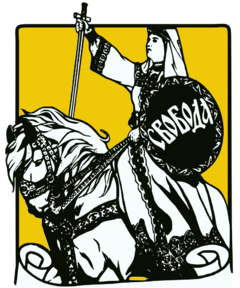Soravian Nationalist and Revivalist Party
This article is incomplete because it is pending further input from participants, or it is a work-in-progress by one author. Please comment on this article's talk page to share your input, comments and questions. Note: To contribute to this article, you may need to seek help from the author(s) of this page. |
Soravian Nationalist and Revivalist Party Зоравська націоналістична та відроджувальна партія Zoravsʹka natsionalistychna ta vidrodzhuvalʹna partiya; ZVNP | |
|---|---|
 | |
| Abbreviation | PNRS/ZVNP |
| First Secretary | Vladislav Pudovkin (1920–1955) Gabriel Tozulyak (1955–1971) Vilem Gardos (1971–1986) |
| Founders | Vladislav Pudovkin Ivan Mykhajlyuk Pavel Klemenko |
| Founded | March 21, 1920 Samistopol |
| Dissolved | March 30, 1986 Bandar e-Inqelab, Zorasan |
| Headquarters | Samistopol, Samistopol FSR, All-Soravian Union of Republics |
| Newspaper | Avans |
| Youth wing | Young Soravians |
| Membership | 10.4 million (1977) |
| Ideology | Majority: Soravian nationalism National conservatism Social conservatism Traditionalism Corporate solidarism Corporate nationalism Anti-socialism Anti-communism Minority: Soravian irredentism Neo-functionalism Minoritarianism Nashism Chauvinism |
| Political position | Right-wing to far-right |
| Colours | Yellow |
| Slogan | "Один народ за вітчизну!" "Odyn narod za vitchyznu!" ("One people for the fatherland!") |
The Soravian Nationalist and Revivalist Party (Soravian: Зоравська націоналістична та відроджувальна партія; Zoravsʹka natsionalistychna ta vidrodzhuvalʹna partiya; ZVNP) was the ruling party of Soravia and later the All-Soravian Union of Republics between 1924 and 1982. After 1936, it was only legal party in Soravia, and ruled uncontested as a one-party state. Its membership of ten million in the 1970s made it one of Euclea's largest parties by civilian membership.
The ZVNP was founded initially by Vladislav Pudovkin, Ivan Mykhajlyuk and Pavel Klemenko as a response to the domestic instability of the Volatile Decades and the presidency of Tadeusz Czyzewski, whose tenure oversaw the Great Collapse and the rapid emergence of socialism in Soravia. When Czyzewski resigned, Pudovkin succeeded him in office in the 1921 elections, selecting Mykhajlyuk as his Minister-President and Klemenko as a cabinet minister. The ZVNP emphasised Soravian nationalism as well as religiously and socially conservative values, amplified when Soravia entered the Great War as part of the Grand Alliance. The ZVNP's rhetoric attracted many wartime generals, and its increasing military influence culminated in a self-coup in 1936 that allowed Pudovkin to usurp the legislature, assume directorial powers and push through a new constitution establishing the ZVNP as a political front for Soravian people. Other parties were either assimilated or banned and their leaders imprisoned. Citing circumstances including the emergence of the Great Game and the wartime rise of the Kriklivets Social Republic. Overall, the early ZVNP was virulently anti-socialist and anti-communist, diplomatically shunning Kirenia almost entirely despite both emerging as victors of the war.
Over time, the ZVNP lessened its rhetoric, including notable rapprochements with the Equalist states, the Amathian Council Republic and the Socialist Republic of Slirnia, though still maintained its major opposition to democratic councilism displayed in Kirenia and elsewhere in the socialist world. Notably corporatist in nature, the party expanded corporate influence over Soravian agriculture and later resource extraction in the 1950s and 1960s. It also solidified military involvement overseas during the Thistle Uprising, bringing the new Amathian Equalist Republic under nominal Soravian influence. When Vilem Gardos took office, he centralised power completely within his own hands, making himself both president and minister-president, partially disregarding the party and emphasis an excessive cult of personality around himself. The party split in 1979 after years of pro-president and pro-party factionalism, beginning the Sostava War.
In 1982, Gardos fled and received political asylum in Zorasan. At this point, the party still nominally existed with himself as president, minister-president and First Secretary of the ZVNP in Soravia's government-in-exile led from the city of Bandar e-Inqelab. Until Gardos' death in 1986, he continued to operate the final vestiges of the party from Zorasan, including the release of a manifesto in 1984 and the maintenance of Avans, the party's newspaper, until 1985. Two weeks after his death, the party was declared defunct and dissolved in Zorasan. One of the largest and most influential political parties of the Great Game, the ZVNP led Soravia through its peaks in global influence, and was succeeded in government by its rival Patriots' Front.